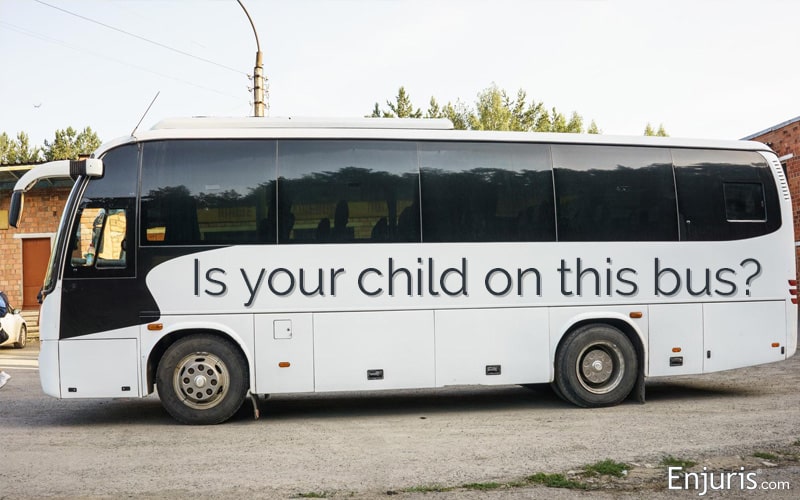
Buses chartered for school trips or events have a different set of guidelines than other types of buses.
If your child travels with their school sports team, goes on field trips, or engages in other off-campus activities, they might be traveling by charter bus. Who is liable if an accident happens?
In September 2023, a tragic bus accident in New York claimed the lives of two adults and left five high school students in critical condition. A group of high school band students was traveling from their home in Farmingdale, New York, to a band camp experience in Pennsylvania. The chartered bus carrying more than 50 students and two high school staff crashed down an embankment on a New York highway. Preliminary investigation yielded that the crash was due to a faulty bus tire. There were no other vehicles involved.
The five students in critical condition, and dozens more who suffered other injuries, recovered. But the emotional scars will remain with these students, their families, and the school community forever. The school and community continue to mourn the beloved teacher and band director whose lives were lost.
This tragedy raised a lot of questions about bus safety and liability. The students were traveling on a bus chartered by their school district. Just a few weeks after the crash, families have filed lawsuits against the charter bus company and the driver. There could be more lawsuits to come, and more defendants.
Accidents on charter buses: Navigating the complexities of liability
Bus accidents can be traumatic, especially when children are involved. One common question that arises after an accident is, "Who's at fault?" For school districts that charter buses, the answer can be a complex interplay of factors.
Who can be liable for a charter bus accident?
- The bus operator, or the company or individual responsible for maintaining and operating the bus. If the accident was a result of the driver's error, poor bus maintenance, or failure to follow safety protocols by the bus operating company, then the bus operator could be held liable.
- The school district or individual school, because it contracts with the bus operator for transportation services. The district might be held responsible if they failed to properly vet the bus company or if they were negligent in their duty to ensure the safety of the chartered bus service.
- A school-based organization could be a parent group (like a PTA/PTO, or another non-profit that’s affiliated with the school) that has its own events and charters buses as its own organization.
- The agency that maintained the road or area where the crash happened. If the crash happened because of a road defect, obscured or missing signs, failed traffic signals, or other property-related hazards, liability could fall on the state or municipality tasked with maintaining the particular roadway.
Alleged causes of the Farmingdale crash
In the Farmingdale accident, preliminary reports said that the transportation company had been listed as an “unacceptable operator” by the New York State Department of Transportation because it failed several safety inspections in 2022. In fact, records showed that the operator had failed five out of 15 total safety inspections that year. The bus had been recently added to the fleet and was inspected by the state DOT first in August 2023, at which time it passed. It also was subject to four additional random roadside inspections since 2021. One of those inspections was conducted by the state DOT and the other three had been in other states.
If an operator is “unacceptable”, then it’s required to have at least two safety inspections per year. It also might require corrective action, which could include violation notices with civil penalties, and suspension or revocation of operating authority.
The cause of the accident was initially reported as a faulty front tire.
The role of the school in student injuries
While the school and the school district are distinct entities, for the purpose of liability, they often get intertwined. A few key points to consider:
Direct negligence. If the school was directly involved in the trip's logistics and failed to take necessary precautions, they might share some liability.
Parent consent. Schools often require parent consent for field trips. However, a waiver does not always exempt the school from all liabilities.
Supervision. If the injury resulted from inadequate supervision by school staff during the trip, the school might be held accountable.
Types of defenses in charter bus-related cases
Several defenses could be raised in such cases:
- Comparative or contributory negligence. In some jurisdictions, if the injured party (in this case, possibly a student) contributed to their injury, the compensation might be reduced. However, this does not seem likely in the Farmingdale incident.
- Act of God. Events that are unforeseeable and unavoidable, like natural disasters, could be used as a defense by both the bus operator and the school district.
- Third-party liability. Another vehicle's involvement in causing the accident can shift or share the blame.
Lawsuit for Farmingdale bus crash
A parent of a student injured in the crash filed a lawsuit against the charter firm and the bus driver involved in the crash. The lawsuit claims that both the charter company and the driver were negligent in ways that caused the tragic accident.
At the time of this writing, the lawsuit was just beginning its process through the legal system and further lawsuits are not yet filed.
These types of lawsuits can be complicated because of the number of parties involved and sorting out liability. If you’ve been involved in an accident with a charter bus, contact a personal injury lawyer for more information or to request guidance on your legal rights.
See our guide Choosing a personal injury attorney.
